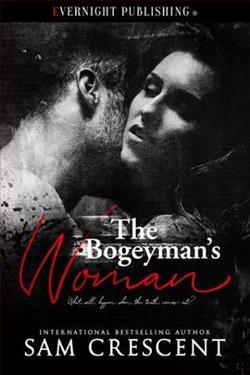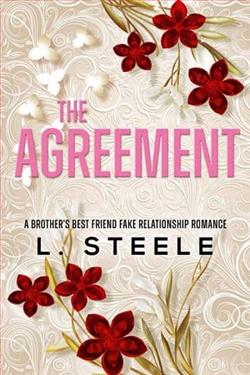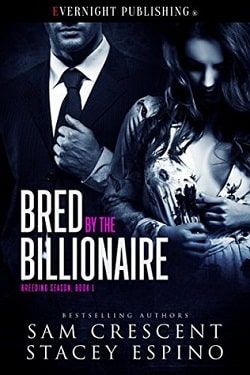Page 25 of Going Home in the Dark
Bobby looked where Spencer pointed. “What about it?”
“There used to be a big, damn, wonderful mural on that wall.”
“Hey, I forgot about the mural,” Rebecca said. “The Leaning Tower of Pisa, the Colosseum ...”
“The Arch of Constantine, the Pantheon,” said Spencer.
“Romulus and Remus being suckled by a wolf,” Bobby recalled.
“Caesar’s legions marching to war,” Spencer said, “the Trevi Fountain, and what we thought was a pissoir but were afraid to ask Mr. Adorno about.” His voice was thick with nostalgia that had an edge of grief. “All gone. Nothing now but a plain wall. Changed.”
They were silent for a moment, and then Bobby said, “I’m sorry about all that about your mom. I know it still hurts.”
“Thanks, amigo. Mom still lives in New Orleans. She calls herself Constanina de Fornay. She never writes.”
“What about your dad?”
“He’ll be up for parole in six years. I never will understand how he went from founding a church to robbing armored cars. I guess he wasn’t who I thought he was. He had a secret self.”
“Well,” Bobby said gently, “the church wasn’t a church like we think of churches.”
With the warmth that was so natural to her even before she learned how to fake compassion and charm an audience, Rebecca said, “Sweetie, don’t put all the blame on your dad. That stripper, Venus Porifera, she was a bad influence.”
“And sweaty,” said Bobby.
“She didn’t intend to be sweaty,” Spencer said, “and it wasn’t a smelly or disgusting sweatiness.” He avoided putting down people for something they couldn’t control, like being short or skinny or having a wart on the nose—or being sweaty without effort. He had endured more than his share of put-downs in his youth because his ears were large, his hands small, and he played the fife in the school band until they decided they didn’t need a fife.
“It must be wrenching,” Rebecca said with tenderness, “to visit your dad in prison.”
“I never do. He refuses to add me to his approved-visitor list. Last time I saw him was thirteen years ago. I came back from Chicago to visit Ernie, decided to drop by the rectory, just to see if Dad was doing okay. He was in a meeting with twelve deacons. They were all wearing black robes, stag antlers, and goat masks. I didn’t stay very long. To tell you the truth, when he was sent to prison, I was relieved. I know that’s a terrible thing to say about your father.”
“Not at all,” Bobby assured him, and Rebecca said, “You didn’t desert your family, your family deserted you.”
The freckled, red-haired waiter arrived at the table, looking unusually Irish to be working in an Italian restaurant. He said his name was Vito, which seemed to be an obvious lie. He asked if they would like bottled or tap water, still or sparkling, domestic or imported, with or without ice, accompanied by a slice of lemon or plain, and if they might also wish to have a cocktail. The aquachoices were so numerous that the amigos passed on water altogether and ordered two bottles of Caymus cabernet sauvignon so that the second could breathe while they consumed the first. Following the events of this day, they didn’t expect to be able to sleep without alcohol. Vito assured them that they had made an excellent choice, as though they usually drank wine that came in a box and had only recently earned sufficient funds to try the finer things in life. Then he went away smiling, perhaps calculating his potential tip.
After lubricating himself with a little Caymus, Bobby asked, “Does the name Wayne Louis Hornfly mean anything to you?”
A frisson of terror shivered through Spencer, but it shook nothing from his compromised memory banks.
Rebecca’s hand spasmed when Bobby said “Hornfly,” and a dribble of wine escaped her glass, and for a moment she looked like she had inShriek, when she had been running for her life through a moonlit cornfield with Judyface in pursuit. Then she put down her wet glass and wiped the bowl and the stem with her napkin.
The napkins were white cloth. Spencer longed for those paper napkins provided in the Adorno’s of yesteryear. They were square with tiny images of pizza slices pointing the way around all four sides. He could see one of those napkins in his mind’s eye, and then he saw one of the coasters with the Coca-Cola logo that the original Adorno’s got free from the soda company and put on the red Formica table when they served an iced drink in a sweating glass. Then he saw a straw wrapped in a paper sleeve and his fingers peeling the paper off the straw with an almost erotic delicacy. He might have toured longer through memories of Adorno’s Pastif, here in Adorno’s Present, Bobby hadn’t said, “It means something to you, doesn’t it? ‘Hornfly’ means something.”
Some readers might find it difficult to believe that Spencer’s frisson of terror would catapult him through mundane memories of paper napkins and coasters bearing advertisements and soda straws. However, you must remember that he was a visual artist who tended to recall moments of his life in images instead of words. That is one of many traits that make artists seem like oddballs to the rest of us, as they stare slack-jawed into space, picturing their way to one conclusion or another.
“Hornfly!” Rebecca said, dragging Spencer fully out of his reverie. “Wayne Louis Hornfly. I don’t know who he is, but when you spoke the name, I saw Anthony Perkins isPsycho, Bela Lugosi in the originalDracula, Boris Karloff inFrankenstein, and Anthony Hopkins inThe Silence of the Lambs.”
It may be necessary to note that, as an actress in films and television, Rebecca was avisualartist of a kind and, in her way, not unlike Spencer Truedove in how she processed information. Unlike painting, acting requires speech, and Rebecca had plenty of that, too, as you will see.
“Bobby, you spoke that name, and my stomach clenched, tightened like a fist, and I felt as if my heart stopped, which of course it didn’t, but I couldn’t breathe, I really couldn’t. I had a horrible moment of vertigo, as if this booth were a spinning gondola in a carnival ride. Wayne Louis Hornfly is someone we once knew, some creep or sicko. But damn it all, I can’t remember anything about him. My memories of him are erased, maybe repressed, but by whom? Why? What does it mean?”
“In the labyrinth of our past,” Bobby said, “something worse than a Minotaur waits around every turn.” Being a writer, heoften thought in metaphors, though they were usually better than that one.
“Google him,” Spencer said.
“He doesn’t google.”
“Everyone can be googled.”















